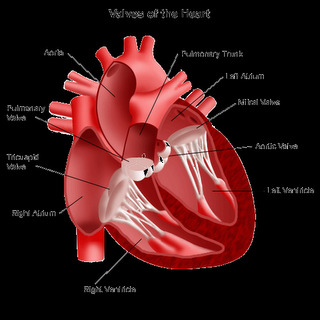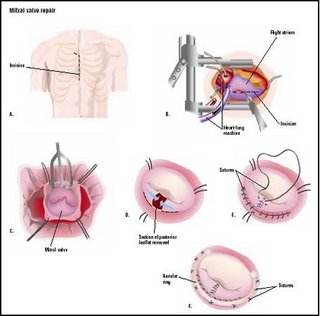Prior to my surgery, my cardiologist suggested that I act like a patient,and not look up my condition on the internet or text books, as it would probably cause more stress and worry than good. Despite the constant urge to surf the web, I resisted and with hindsight, this was probably the best thing I could have done. However, now that my surgery has been a success and my heart is all better, it's time to hit Wikipedia!
So basically I had a case of chronic mitral regurgitation. This was caused by Myxomatous degeneration of the mitral valve, which is apparently the most common form of mitral regurgitation, and is more common in males, and in advancing age (very rare at 29!). In my case, it was caused by a genetic abnormality from birth that results in a defect in the collagen that makes up the mitral valve. This causes a stretching out of the leaflets of the valve and the chordae tendineae (the tendons that attach the leaflet to the heart muscles). The elongation of the valve leaflets and the chordae tendineae prevent the valve leaflets from fully coming together when the valve is closed, causing the valve leaflets to prolapse into the left atrium (which re-opens that valve during the phase when it should be shut), thereby causing mitral regurgitation.

Here is a picture showing the position of the mitral valve. The leaflets of the valve (six of them)close together to form the oval valve, while the white tendons (chordae tendineae) attach the leaflets to the heart muscles. In my case, one of the chordae was not pulling down correctly, so the valve wasn't shutting properly. This is most likely the developmental genetic abnormality, and with age it has gradually worsened to the stage that the chordae and attached leaflet were flailing, presumably ruptured due to the constant strain (over a number of years) upon my heart.
The degree of severity of mitral regurgitation can be quantified by echocardiogram, by the percentage of the left ventricular stroke volume (blood volume being pumped through the heart) that regurgitates into the left atrium (the regurgitant fraction). The degree ranges from mild (<20 regurgitant fraction), moderate (20-40), moderately severe (40-60) and severe (>60). I had severe mitral regurgitation! How serious is this? Well basically, this means that for every beat of my heart, only 40% of the blood that is supposed to be pumped to my lungs and my body is actually getting there! The other 60% is flowing back into the wrong chamber of the heart (left atrium).
So what does severe chronic mitral regurgitation do to the heart? Well, initially the heart is able to compensate for less efficient pumping of blood around the body by getting bigger and pumping harder/more. So, the left ventricle develops eccentric hypertrophy (gets bigger, although 300% bigger as in my case is a major concern) in order to better manage the larger than normal stroke volume (the heart tries to pump more blood volume to compensate for the 40% efficiency rate). The eccentric hypertrophy and the increased diastolic volume combine to increase the stroke volume (to levels well above normal) so that the forward stroke volume (forward cardiac output) approaches the normal levels.
In the left atrium, the volume overload causes enlargement of the chamber of the left atrium (again in my case 300% of normal size is not good!), allowing the filling pressure in the left atrium to decrease. This improves the drainage from the pulmonary veins, and signs and symptoms of pulmonary congestion will decrease.
So ok, the heart can compensate, basically by getting bigger. But this can't last forever - so what happens long-term? Well basically, at some stage the heart can no longer compensate for the severe mitral regurgitation. The ventricular myocardium is no longer able to contract adequately to compensate for the volume overload of mitral regurgitation (basically the heart muscle gets worn out), and the stroke volume of the left ventricle will decrease. The decreased stroke volume causes a decreased forward cardiac output and an increase in the end-systolic volume. The increased end-systolic volume translates to increased filling pressures of the ventricular and increased pulmonary venous congestion. The individual will develop symptoms of congestive heart failure. These include shortness of breath, pulmonary edema, orthopnea, paroxysmal nocturnal dyspnea, as well as symptoms suggestive of a low cardiac output state (ie: decreased exercise tolerance). Cardiovascular collapse with shock (cardiogenic shock) may be seen in individuals caused by sudden papillary muscle rupture or rupture of a chordae tendineae caused by the chronic strain placed upon the heart (sound familiar? This is probably why I collapsed).

The only treatments for severe mitral regurgitation are urgent mitral valve repair or replacement. Lucky for me, my valve has been repaired! Hooray! No-one is entirely sure how long the repair will last since the first mitral valve repairs were pioneered by a French heart surgeon, Dr. Alain F. Carpentier, in the mid 1980s. But i'm hopeful it will last forever! Here is a picture of how my mitral valve was repaired. I've had an annuloplasty, which is where the damaged part of the valve and chordae has been cut out, the rest of the valve stitched together and a ring used to tighten the valve so that it fits together properly.
When I get the echocardiograms from my cardiologist I'll post them so that you can all see the difference between my severely stuffed and newly repaired mitral valve.












